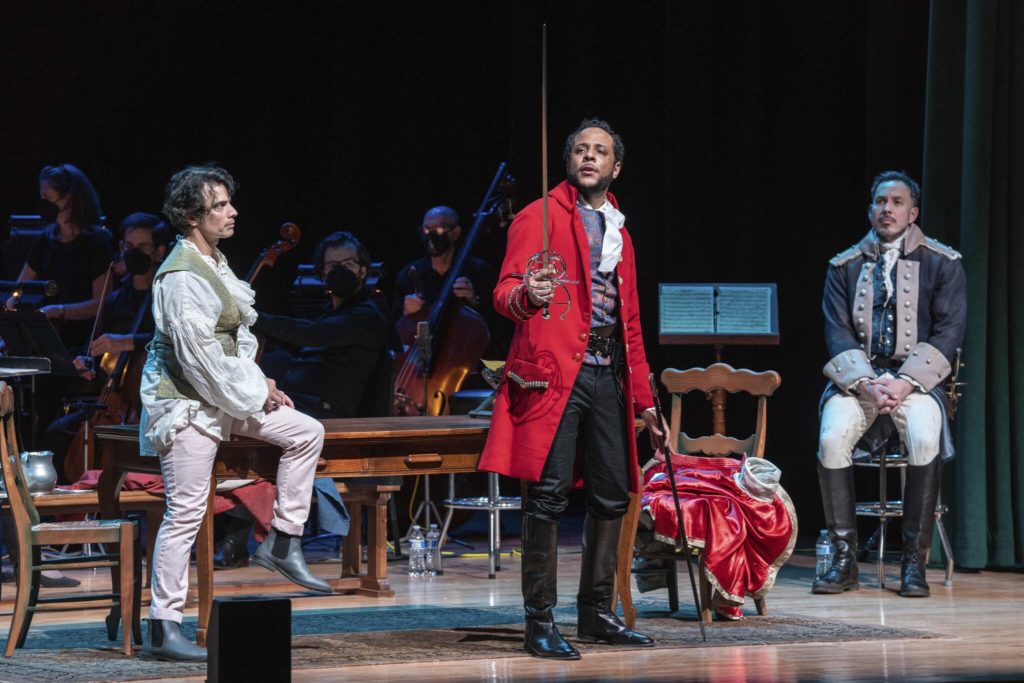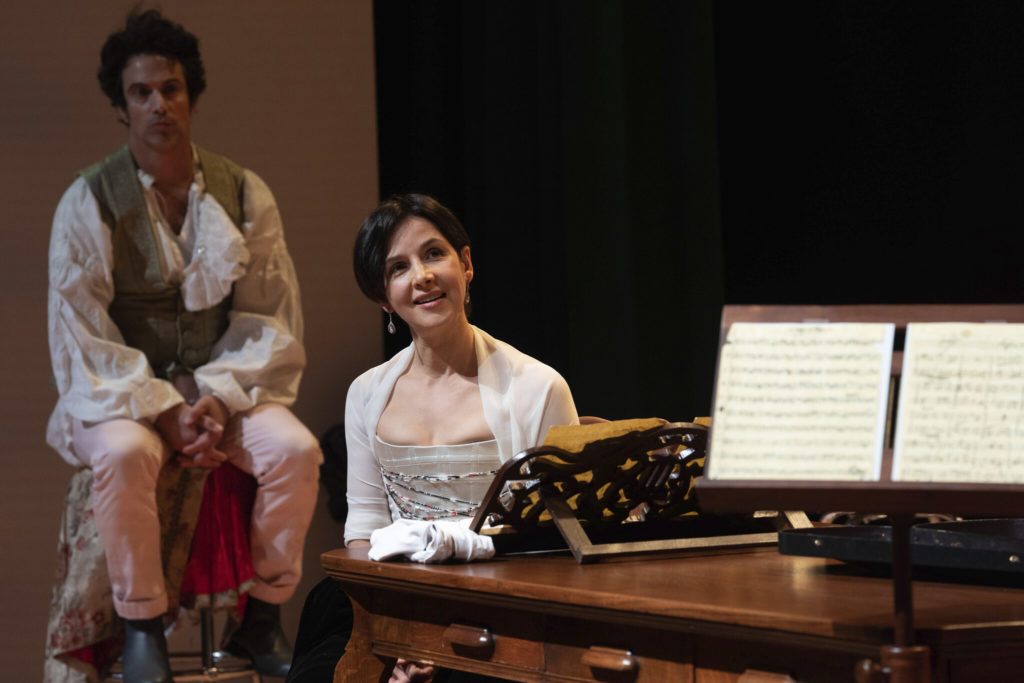
According to writer and director Bill Barclay, he was consciously trying to right a wrong when he conceived and created, The Chevalier. The wrong was the near universal ignorance of an exceptional person who failed to receive the historical prominence he deserves due, in large part, to the color of his skin. The Chevalier, Barclay’s shimmering theater work on the life and legacy of Joseph Bologne, was presented over the weekend in collaboration with the Music of the Baroque and the Chicago Symphony Center. Equal parts theatrical dramatization and classical music performance, The Chevalier rekindles that lost recognition by reintroducing the world to Bologne, a man who excelled in anything he pursued. Splendid violinist, prolific and accomplished composer, invincible swordsman and fencer, acclaimed conductor and passionate anti-slavery activist, the breadth of his accomplishments made him famous throughout 18th century Europe. Given his progeny and the sage guidance he doubtlessly received from each of his parents, Bologne may have felt he had little alternative other than to be the best of the best at everything he did.
Things could have taken a very different turn. Bologne’s father, Georges de Bologne, was a French plantation owner on the Caribbean island of Guadeloupe. His mother, Nanon, was enslaved there and is said to have been the 16-year-old maid of Georges de Bologne’s wife. Joseph could have easily slipped into oblivion at birth. Recognized and loved by his father, not only was he nurtured, he was groomed to take up a mantle of purpose and achievement. He, his father and his mother Nanon moved to France where he entered boarding school and later enrolled in the Royal Academy of Fencing and Horsemanship. So thorough was his education that it also included extensive music training. Although renowned for his fencing prowess and knighted for his contributions to military campaigns, it’s his musical accomplishments that eventually galvanized the bulk of his fame during his lifetime and today. The Chevalier (the Knight) showcases music Bologne composed and performed while portraying an engrossing dramatization of his life.

Sliding from storytelling to classical concert performance with fluid ease, the production displayed an effortless balance between the two. Accompanied by the Music of the Baroque Orchestra under the conductorship of Dame Jane Glover, violinist Brendon Elliott portrayed Bologne during the musical elements of the performance. New York based actor RJ Foster played Joseph Bologne, Chevalier de St. Georges, during the program’s theatrical dramatizations. Together they reveal a fascinating glimpse into the spectacular career of a singular individual.
The dramatization portion of the production helps us understand Bologne’s importance to and impact on the age in which he lived. By the time he was 21, his position among the Parisian elite was well established. After graduation from the Royal Academy, he was appointed an officer of the King’s Bodyguard and had been extended the title chevalier. A few years later he captivated cultural Paris with a sensational violin solo he performed with an ensemble of professional and amateur musicians.
Capsulized in highlights, Bologne’s life appeared ideal. His talent and gifts resulted in success in endeavor after endeavor. But he was still an oddity in the world he inhabited. Slights, bias and open bigotry were as much as part of his existence as his accomplishments. The Chevalier gives breath to the complete reality of Bologne’s life. RJ Foster’s beautiful depiction of that totality allows you more to completely comprehend the fortitude and integrity of a man whose dignity and self-esteem precluded base responses.

Bologne’s relationship with Marie Antoinette, a serious supporter of music and a respected musician in her own right, revealed the essential role the arts played in 18th century Europe and the stature Bologne enjoyed in that world. Fleshed out and allowed to expose the limitations as well as the leverage power possesses, Merritt Janson as Marie Antoinette coolly presented a character of depth, compassion and brains.
Mozart was not only a contemporary of Bologne’s, the two briefly lived under the same roof for a brief period. Older and more established, Bologne’s was the brighter star at the time; leaving Mozart to rely on him for guidance, favors and advice. Played in this performance by David Joseph, Mozart is rebellious, head strong and often a funny talent who’s grieving the death of his mother and trying to wrangle a breakthrough in his career.
Music underpinned, framed and joyously often took center stage throughout Barclay’s two-pronged wonder. Featuring an array of original work composed by Bologne that includes symphonies and violin concertos, audiences heard for themselves how gifted the Chevalier de Saint-Georges was a composer. Both the Music of the Baroque’s orchestra and Elliott as guest violin soloist exemplified how skillfully and insightfully beautiful music can be presented. It’s hard to imagine how Mr. Barclay’s effort to right a wrong could have succeeded as well as it has with astounding effort.
The Chevalier
February 19th – North Shore Center for the Performing Arts
February 20th – Symphony Center, Chicago
baroque.org/chevalier